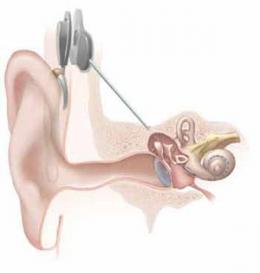LC Interpreting Services is now SignNexus!
Raising A Deaf Child
 After months of worrying about nursery colors and baby names, the big day has finally arrived! Your healthy bundle of joy is born with 10 fingers and 10 toes; crying and cooing in your arms. The baby is beautiful, your family is complete, everything feels perfect! Fast forward a few months down the road when, during a routine checkup, your pediatrician informs you that your infant can not hear. Suddenly, you’ve become the parent of a deaf child. What now?
After months of worrying about nursery colors and baby names, the big day has finally arrived! Your healthy bundle of joy is born with 10 fingers and 10 toes; crying and cooing in your arms. The baby is beautiful, your family is complete, everything feels perfect! Fast forward a few months down the road when, during a routine checkup, your pediatrician informs you that your infant can not hear. Suddenly, you’ve become the parent of a deaf child. What now?

Discovering that a child is deaf can stir up a wide range of emotions in new parents. Most commonly, they feel shock, sorrow, and helplessness. Unfortunately, because many doctors deliver this news as a medical “diagnosis,” parents automatically believe that their child is ill. Or, worse, disabled! It causes a chain reaction of guilt, sadness, and fear. How will you raise your deaf child? You wonder if he or she will be able to have a good life. You wonder if you can “fix” them.
This topic is close to my heart because my grandparents learned that my mother was deaf when she was less than a year old. At that time, they didn’t know any deaf people, and had no idea what it would mean to raise a deaf child in a hearing world. My grandparents worried that their daughter would not be able to have a happy childhood, or a normal adolescence. Would she have friends? Would she be able to drive a car? Would she be able to laugh and have fun? There are so many misconceptions. Of course, as time went on, they discovered that deaf kids definitely can do all these things, and excel at them!
 Selecting a method of communication for your child majorly influences where he or she will fit into society, and is critical to psychological development. There are several communication options to consider, depending on the child’s degree of hearing loss. Some parents choose to teach their deaf child to speak English using hearing aids and intensive speech training. In this approach, the child does not identify as deaf, and does not learn deaf communication.
Selecting a method of communication for your child majorly influences where he or she will fit into society, and is critical to psychological development. There are several communication options to consider, depending on the child’s degree of hearing loss. Some parents choose to teach their deaf child to speak English using hearing aids and intensive speech training. In this approach, the child does not identify as deaf, and does not learn deaf communication.

Another option is the controversial, and increasingly popular cochlear implant– a fairly invasive surgical procedure where an electronic device is implanted into the baby’s head to simulate the sound-processing of a functioning ear. Modern science has come a long way with these prosthetics and, although the child will never experience hearing the same way as a non-deaf person would, they can technically hear. With many years of language therapy, cochlear implant patients can be nearly indistinguishable from their hearing peers. But communicating in the hearing world will never be simple for them, because science simply has not been able to replicate the subtle and specific nuances of our natural senses. These children are prone to rely on lip-reading and facial cues, and many require a number of educational resources to keep up with their peers in school. Parents are likely to consider this surgical procedure to “remedy” their child’s deafness because they want to make sure their child speaks and understands the same language they do. This is understandable, but is it what is really best for your deaf child?
As any deaf person will proudly tell you, deafness is an identity, not an impairment. They do not consider deafness a problem that needs to be “fixed.” Deaf culture is active, full of positive role models; and ASL is a rich, constantly evolving language. Another option for teaching your deaf child to communicate is to enroll him or her into a residential school. Deaf residential schools are staffed by deaf teachers fluent in ASL, who work with deaf toddlers all the way through high school to educate them in a way that is focused on their individual learning styles. Allowing your child to be deaf, to learn sign language, and to integrate with other deaf people is a great way to promote an atmosphere of equality, independence, and nurturing. The drawback of residential schools, of course, is that deaf children are separated from their parents. Fortunately, many have reported that the atmosphere of deaf culture fosters great mentor relationships at these institutions.
Being that I come from three generations of deafness, there is a high possibility that I may have deaf or HoH children, and I have to be prepared to teach my children both ASL and American English. If you wish to speak the same language as your deaf child, why not learn the language that was created just for them? Total communication strategy focuses on integrating both ASL and speech therapy, to provide opportunity, without altering the child’s identity. Embracing deaf culture as a family seems to me like a great compromise for helping your kids adjust to the world using all the tools available! Spoken communication is important in our audio world, but it is also extremely important for deaf children to be able to sign with their peers so they can communicate freely, and feel connected. If they decide not to speak out loud or sign later in life, that would be their choice. My guess would be they will cherish both hearing and deaf culture, and embrace both for the rest of their lives. Bilingualism is such a fantastic way to see the world through different eyes, and provides a real advantage to your deaf child! Now that I have provided you with the current options the choice is ultimately left in your hands. What will you decide to do?








[…] Raising a deaf child. […]
Hello Kasey,
If the parents of the Deaf child doesn’t learn to sign or introduce the child to some form of Deaf culture or signing, that child will most likely never have an language until they reach school and by that time they will be behind their peers when it comes to communicating. Many schools stick interpreters with a child that has no language and they expect that child to be able to communicate with them but they fail to realize that the child has no language because they haven’t been exposed to any language.
Great article. I will be facing a few of these issues as well..
I completely agree and the reason why is because there are different philosophies when it comes to raising and educating deaf and HoH children. I strive to bridge the gap though we all have to take part in this movement of change. Thank you for sharing your thoughts.